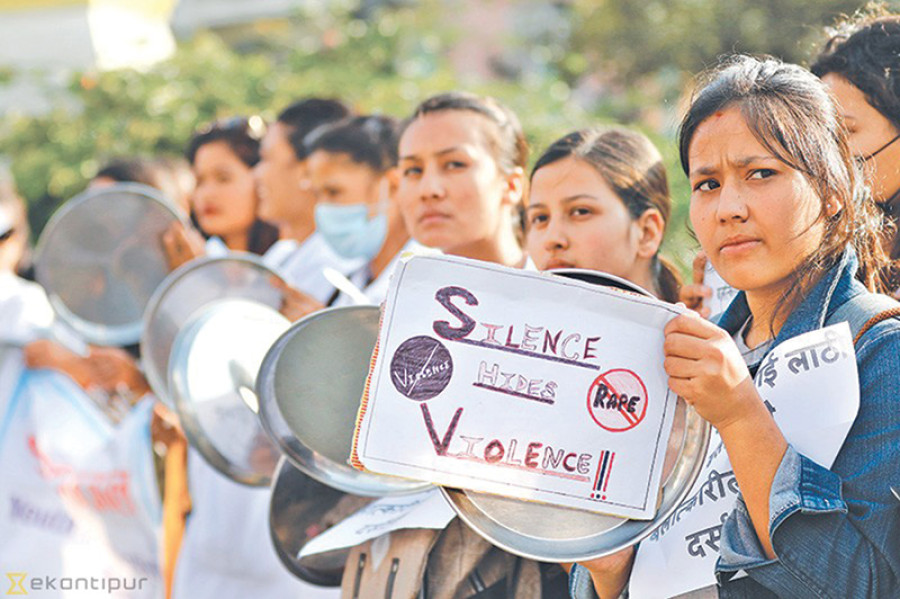Opinion
Nirmala’s unsolved case
It has been more than 100 days since Nirmala Pant’s lifeless body was found in a sugarcane field in Bhimdattanagar, Kanchanpur, but it seems as though nothing has changed.
Udayan Regmi
It has been more than 100 days since Nirmala Pant’s lifeless body was found in a sugarcane field in Bhimdattanagar, Kanchanpur, but it seems as though nothing has changed. Despite alterations to the Nepal Police team overseeing Nirmala Pant’s case, the formation of an independent commission, and the initiation of an investigation by the National Human Rights Commission, no progress has been made in bringing her killers to justice.
Even though nothing has changed, people from other parts of the country are tellingly silent. The scores of demonstrators who filled Maitighar Mandala in September are nowhere to be found. As some activists have pointed out, many of those who claimed that they ‘stand with Nirmala’, as their viral hash tags promised, have yet to act on their commitments. But the biggest failing is that of the state.
The government of Nepal took various steps to investigate the crime and locate the perpetrators. Different committees were formed to look into the crime. Highly qualified officials were assigned this task. Evidence was collected from the crime scene, and DNA samples of the suspects were tested. The committee submitted its report to the Home Ministry. These are indeed praiseworthy steps taken by the state. However, numerous aspects attached to this case depict how it has failed not only to provide justice to Nirmala and her family but also curb impunity.
The rights of women and victims of crime are enshrined in various pieces of constitutional legislation, but they have not been implemented. Citing bottlenecks in the bureaucratic process, leaders involved in the investigation have continually delayed providing any new directions. On August 23, scores of protesters filled Kanchanpur streets to express their concern over the failure to implement laws. Appallingly, several human rights abuses occurred during these protests. The police opened fire, leaving at least 10 people injured. They also continually took people into custody and misused their authority. Those in custody were released only after they signed an affidavit against their will; again, a clear breach of their individual right to freedom.
A video depicting several police officers destroying evidence at the crime scene spread like wildfire on social networking sites. Such a publically witnessed act has not only hampered the pursuit of truth behind the case, but also created an atmosphere of mistrust towards the Nepal Police and the government itself. The concealment of the crime by the investigators themselves is a crime in itself and should be treated as such. The authorities delayed taking action against those involved in the misuse of power with the intention of protecting people with political connections. They also violated the right against torture when they falsely accused Dilip Singh Bista of the crime. He was released after his DNA didn’t match the semen sample taken from Nirmala’s body.
Furthermore, the government has failed to acknowledge the general public’s right to information about the case. Though transparency and accountability are the fundamental pillars of democracy, the treatment of Nirmala’s case exemplifies how these pillars remain untouched in Nepal. The constitution and laws protect the people’s right to information on public matters. However, we are left with only speculations regarding the facts of the crime. Basic logic dictates that people have a right to know about public matters, and ensuring it is the government’s responsibility.
The rape and murder has not only shaken up people but also demonstrated lack of the rule of law in the country. Nirmala’s case got the deserved attention as it took a massive form, but the government has shown reluctance in prosecuting many crimes in the past. Numerous cases from the conflict and post-conflict eras are awaiting justice. The state has denied justice sometimes by hiding behind the excuse of the transitional justice mechanism, and at other times by showing disinterest in punishing those responsible for the crime. Many perpetrators still remain at large.
Although Nirmala’s case became emblematic, this is not the first time the government has turned a deaf ear to the voices shouting for justice. All in all, no democratic state should turn away from the responsibility of conducting an effective investigation into the crime, digging out the details, prosecuting the offender and providing effective remedy to the victim and the family.
Regmi is an associate at Advocate at Associates Hub.




 22.12°C Kathmandu
22.12°C Kathmandu










